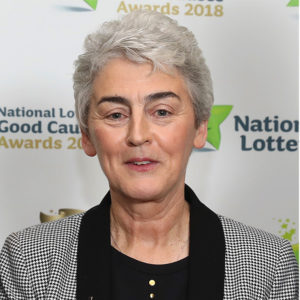 Sr. Helen Culhane is Director of the Children’s Grief Centre. She worked for thirteen years as a social worker with the HSE in the area of Child Protection and Child Psychiatry. In 1991, she obtained an advanced diploma in child protection from Trinity College. In 2001, Helen moved to a role as Senior Social Worker to Milford Care Centre where she set up and facilitated a group work support programme for bereaved children. It was through these types of work situations that Helen developed a clear awareness and insight into the needs of children and young people who were being affected by the death of a loved one and the relative dearth of services and supports for these children and young people. Helen also became more aware of children and young people who were suffering loss in other ways and especially through the separation and divorce of parents. Her work over the years has allowed her to build up a wealth of experience in working with children and adults. Helen qualified as a counsellor and psychotherapist with the Dublin Counselling Centre in 2015. Since its foundation in 2009, the Children’s Grief Centre has worked with over 1,500 children.
Sr. Helen Culhane is Director of the Children’s Grief Centre. She worked for thirteen years as a social worker with the HSE in the area of Child Protection and Child Psychiatry. In 1991, she obtained an advanced diploma in child protection from Trinity College. In 2001, Helen moved to a role as Senior Social Worker to Milford Care Centre where she set up and facilitated a group work support programme for bereaved children. It was through these types of work situations that Helen developed a clear awareness and insight into the needs of children and young people who were being affected by the death of a loved one and the relative dearth of services and supports for these children and young people. Helen also became more aware of children and young people who were suffering loss in other ways and especially through the separation and divorce of parents. Her work over the years has allowed her to build up a wealth of experience in working with children and adults. Helen qualified as a counsellor and psychotherapist with the Dublin Counselling Centre in 2015. Since its foundation in 2009, the Children’s Grief Centre has worked with over 1,500 children.
Under what conditions do you get your best work done?
Team relationships are supported and nurtured by ensuring my place of work is welcoming and inviting. I set goals for myself, my team and the organisation. The approach I take is to include key staff in brainstorming sessions before the commencement of a project. This allows me to put a plan in place where I can delegate tasks with targeted deadlines. Communication is vital and progress review meetings are held regularly which allows us to make any necessary amendments to the plans. This also gives staff and volunteers an opportunity to voice concerns about issues and to identify what is working well.
Have you had a mentor and if so how did this person impact you?
I worked with the late, Sister Joan Bowles who was the director of the Limerick Youth Service in Limerick. Sr. Joan was my mentor when I first started working with young adults and children. She was an inspiration to me. She believed that each individual should be uniquely valued and treated with love. She enriched the lives of young people with dignity, hope and courage. In her time, she challenged systems that proved negative and she provided alternative structures leading to more practical and more positive ways of living for disadvantaged young people. Her patience, her compassion, her positive and straightforward approach all helped to give life and character to the young people. In my daily life, I try to follow in her footsteps.
What is the one mistake you witness leaders making more frequently than others?
In my experience, there is a danger that leaders can start believing they have all the answers and don’t take time to encourage teamwork and listen to colleagues.
As organisations get larger there’s often a tendency toward dampening inspiration. How do you encourage creative thinking within you or your client’s organisations?
Within my team, I have staff and volunteers with a range of skills and vast experience. They are supported within our structure by one to one case management. Group supervision is also provided by an external psychotherapist. The business plan was drawn up by staff, the board of management and volunteers. This outlines the vision for the organisation. I encourage the staff and volunteers to use their talents and share ideas within the team. By involving all the team this encourages creative thinking. I attend supervision on a monthly basis. I assure that I have relaxing breaks and attend training and conferences where I network and bring new ideas back to the centre. What I find most beneficial is when I attend silent retreats where I get in touch with my deepest self.
What qualities do you believe are the most important to be a leader? If not all these qualities come naturally, do you have any tips on how to cultivate them?
In my opinion, being a good listener is one of the most important qualities of a good leader. The ability to communicate effectively both professionally and personally, to have the ability to connect with their staff on all levels.
If you had to name three characteristics of great leaders what would they be?
- Sense of humour
- Honesty
- Courage to delegate
